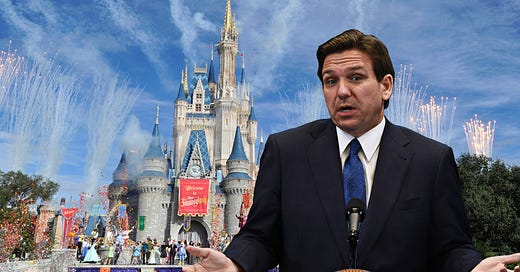
It’s possible—in fact, it’s quite likely—that the Walt Disney Company would have canceled its billion-dollar office development near Orlando even if it hadn’t been embroiled in an ongoing feud with Florida Gov. Ron DeSantis. The timing, though, was exquisite: even as DeSantis was preparing to announce his run for president of the United States, Disney was showing the world that the same man who had managed the pandemic so skillfully was foolishly overplaying his hand against the most important company in his state.
The office park was the brainchild of former Disney CEO Bob Chapek—the same Bob Chapek whose public criticism of Florida’s so-called “Don’t Say Gay” bill in March 2022 sparked DeSantis’ fury, causing him to accuse Disney of being a “woke” corporation that didn’t deserve to be placed on a pedestal in Florida.
Disney had been promised almost $600 million in tax abatements from the state to build the complex, and Chapek planned to fill it by moving 2,000 employees in its Imagineering department from California to Florida. (The Imagineers are the folks who design the attractions at Disney theme parks.)
But last November, with the stock down and shareholder activist Nelson Peltz agitating for a seat on the Disney board—and with the Florida legislature voting to punish Disney by eliminating a special district it had controlled for over half a century—Chapek was abruptly fired. To the surprise of no one, the Disney board replaced him with Bob Iger, the company’s previous, much-admired chief executive officer.
Iger, it turns out, had never liked Chapek’s plan for the development. He believed that the Imagineering department belonged with the rest of the company’s creatives in California. What’s more, the cost of the office complex had risen by a half a billion dollars, and had been delayed by at least two years, even as Iger was promising Wall Street that Disney would reduce its costs by $5 billion. From a purely business point of view, canceling the office complex was a no-brainer.
But who cares about the business rationale? Certainly not the media—not when the mid-May cancellation could be framed as the smooth-as-silk Iger hitting back at the bull-headed DeSantis. So that became the story.
“Disney Sticks it to DeSantis,” read the headline at the showbiz website Deadline. The Orlando Sentinel, which normally would be expected to criticize a company that was robbing the area of jobs and six-figure salaries, instead aimed its fire at the governor. The Disney announcement, the paper editorialized, was a “gut punch” to those who had tolerated DeSantis’s “tantrums and bullying, and a wake-up call to voters who might have seen him as a Trump-like maverick.”
This week, Ron DeSantis is expected to announce that he is running for president. Although he’s trailing former president Donald Trump by an average of 36 points in the polls, he appears unperturbed. On the same day as the Disney announcement, DeSantis told key donors not only that he was going to run but that he was the only Republican who could beat President Joe Biden. (His thesis is that Trump has so alienated independent voters that the former president can never win the swing states.)
It’s been obvious for many months, of course, that DeSantis was going to run for president. His super PAC (“Never Back Down”) has reportedly already raised $33 million and is at work in several primary states. Added to his gubernatorial reelection campaign account, DeSantis has a $110 million war chest waiting to be deployed. In a must for any presidential candidate, he published a book, “The Courage To Be Free,” in February. His recent book tour just happened to take him to three early primary states: Iowa, Nevada and New Hampshire.
Yet even on the eve of his big announcement, the specter of Disney looms large. The DeSantis brain trust no doubt expected his phone call to top donors last Thursday to dominate the news cycle (a New York Times reporter was allowed to listen in); instead, the Disney news soaked up most of the media attention. Disney is Florida’s largest private employer and one of America’s most trusted corporations. Its $82 billion in annual revenue comes from creating wholesome family entertainment. At some point, if DeSantis doesn’t stop making Disney his whipping boy, voters are going to ask themselves: what is this guy smoking?


